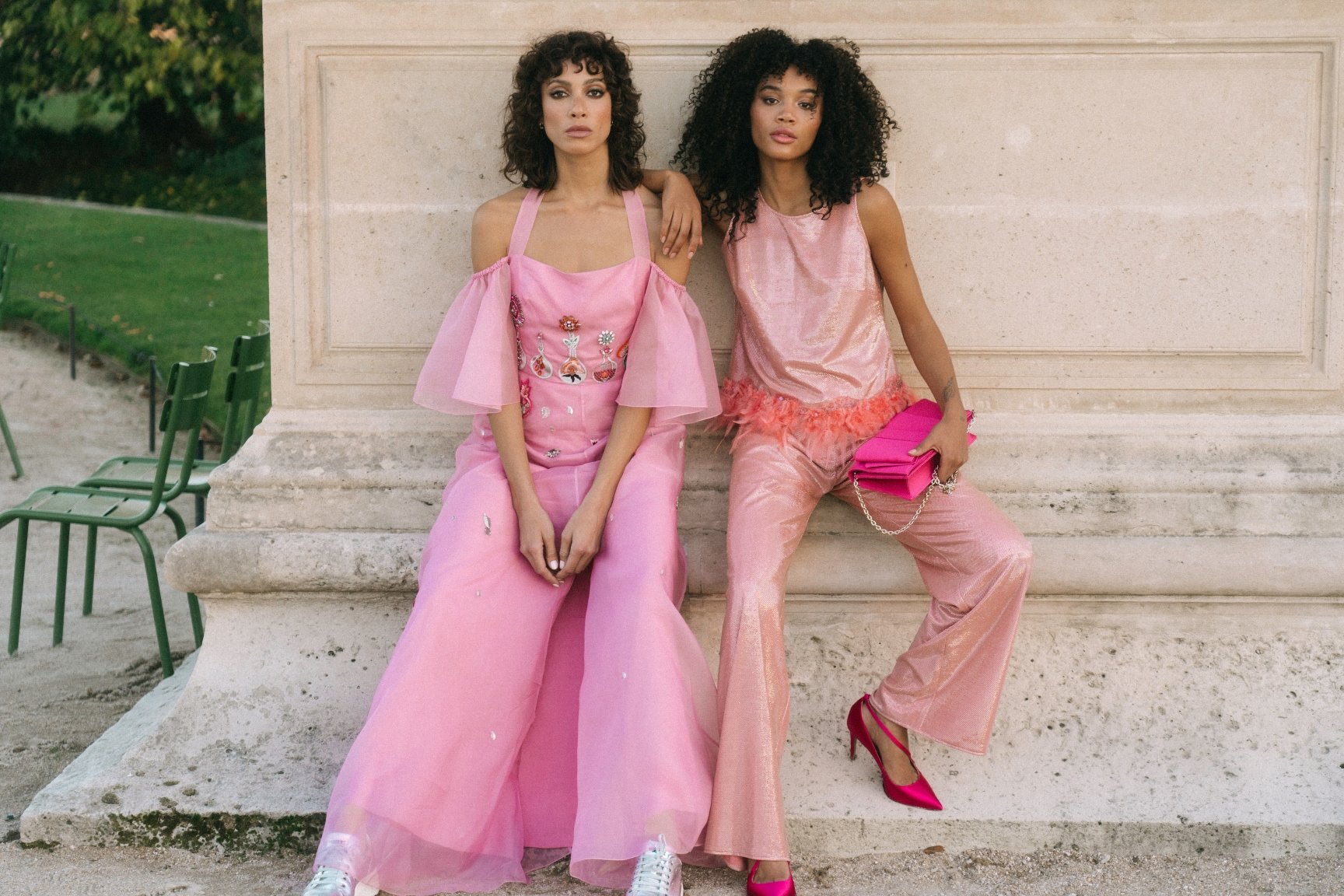Otrium - Giving New Life To End-of-Season Fashion
Otrium is on a mission to create a more conscious and sustainable fashion industry. By leveraging technology to connect conscious consumers with excess stock from leading brands. They are empowering people to reduce industry waste and shop more consciously while giving fashion brands a lasting presence. With their innovative approach, Otrium is reducing the amount of clothing that is sent to landfills and providing customers with access to stylish and affordable fashion. By working directly with brands to sell their end-of-season inventory for up to 75% off, Otrium is helping to create a future where all clothing is worn. Jejune had the opportunity to speak with Zuhairah Scott Washington, President & Chief Operations Officer of Otrium, about their mission to create a more sustainable and affordable future for the fashion industry. Read our exclusive interview below to learn more!
Where is Otrium based?
Otrium is a purpose-driven, remote-first, global fashion platform. Our main HQ is in Amsterdam, and we have additional hubs in New York and London that reflect our global market focus.
What inspired you to become involved in fashion sustainability and what drives your work in the field?
I have fond memories of growing up, taking the train from New Jersey to New York City to shop at Macy's with my mother and grandmother. Learning how to define and refine one’s own personal style is a right of passage in my family. Many black women use fashion as an external signal to the outside world that they are worthy, cared for and adorned. In a world that consistently is sending the opposite message to black and brown bodies, fashion can be a subtle act of protest. While I’ve always considered myself fashionable, I never seriously considered a career in fashion until I was introduced to Otrium and its purpose. As a purpose driven leader, combining something I already loved - fashion - with a deeper why - sustainability - was a dream opportunity. I love how my work allows me to give others the freedom to define their own style on their own terms at a great value, all while having a positive impact. Our purpose, “All clothing should be worn.” drives my work in the field. It is at the core of everything we do. Similar to the circular model, at Otrium, we aim to close the loop of the previously linear industry model, by selling the unsellable.
What makes Otrium unique in the sustainable fashion marketplace?
The fashion industry has a problem: waste. Fashion is trapped in a broken cycle of overproduction: creating stress and waste for brands, people, and natural resources. Around 12% of all clothing remains unsold, ending up with discount buyers or worse, incinerated or in landfill. Unsold inventory has become a huge burden, not just for the fashion industry, but for the planet. That is where we come in. Otrium’s vision is to become the gateway for off-price fashion globally.
Otrium is eliminating unsold inventory and changing the way fashion is created and sold. Through our mission to transform the end-of-season segment through technology, we’re flipping the traditional fashion industry model that relies heavily on seasonality, trend, physical retail, or stock buyers. With every item we sell, we divert textile waste away from countries like Ghana and Chile which often end up burned or in landfills. We work with designer brands to list excess end-of-season inventory while giving shoppers access to their favorite brands at unbeatable prices. This reduces the need to purchase fast fashion alternatives and ensures that any excess inventory from our partner brands finds a home. Together with our customers, we are striving for a circular fashion future.
How has Conscious fashion evolved over the years?
In the past decade there has been a global shift toward sustainable fashion legislation that includes garment industry worker’s rights, greenwashing, and brand responsibility. While corporate self-regulation was once the norm, wide-reaching legislation is becoming increasingly prevalent. Last year, the European Union outlined a set of proposals to change the way fashion operates, bringing it in line with sustainable measures. The strategy follows the supply chain from design to production and end of life. Under the proposal, the commission would set new standards for the durability and reusability of textiles, curb the use of hazardous chemicals, encourage extended producer responsibility (EPR), introduce bans on the destruction of unsold textiles, and unlock circularity through digital product passports. It also would require companies to include information about how sustainable and recyclable a clothing item is on its label. The EU has called for an end to fast fashion by 2030. New legislation is quickly approaching worldwide. In New York, the Fashion Sustainability and Social Accountability Act will be voted on within the current New York State Senate legislative session that spans from January through June of 2023. If passed, the Fashion Act will mandate supply chain mapping and transparency, yearly environmental and social sustainability reporting, impact disclosures, and a Community Benefit Fund. This bill will hold all fashion companies selling or operating in New York accountable. Conscious fashion is soon to become the standard, not the exception, and at Otrium we have committed to being part of it.
How has the demand for sustainable fashion products evolved since Otrium's launch?
The demand for sustainable fashion products has skyrocketed since Otrium’s launch in 2016. Through the push for transparency and consumer education, shoppers have become increasingly aware of the environmental and social impacts of their purchases. As a result, sustainability moved from being a mere conversation to becoming a key consideration in purchase decisions. A recent study by NielsenIQ found that 78 percent of US consumers say that a sustainable lifestyle is important to them. A joint study from McKinsey and NielsenIQ analyzed five years of US sales data, from 2017 to June 2022. The data covered 600,000 individual product SKUs representing $400 billion in annual retail revenues. The study concluded that consumers are shifting their spending toward products with environmental, social, and governance (ESG)-related claims, and that both large and small brands alike saw increased popularity in their ESG product offerings. Otrium has chosen to prioritize and invest in sustainability-related actions that deliver the greatest advancement of our overall consciousness commitment and to inform customers of the environmental impacts of these initiatives.
What do you see as the future of sustainable fashion and how is Otrium positioning itself to be part of it?
The future of sustainable fashion is accountability, transparency, and most importantly, no waste. Otrium believes that fashion’s linear ‘take-make-waste’ model can be transformed into a circular approach that is restorative and regenerative by design. To help diminish the take-make-waste pattern, we must close the loop. Circularity or the circular economy is a system of closed loops in which raw materials, components and products lose as little value as possible renewable energy sources are used, and systems thinking is used. Much like the circle shape, the garments and products are put back into the cycle of the industry, rather than ending up in landfill sites or disregarded as waste. This is a purpose that Otruim cares about and envisions in the future. To work toward ensuring this future, Otrium has an ongoing collaboration with Good On You.
Good on You is an independent rating agency globally recognised for its work in assessing brands’ performance regarding their impact on people, the planet, and animal welfare. Good On You bases its ratings on publicly available information including industry standards, certifications, other third-party assessments, and a brand’s own reporting. We highlight conscious brands on our platform so that our customers can make informed shopping decisions. Otrium has also committed to measuring our impact through our Impact Progress Report, Fashion Impact Report, and Carbon Footprint Report. The goal of these reports is to have reliable data to feed into our sustainability strategy moving forward. They function as a baseline to understand our impact and set goals, as well as functioning as a benchmark for our future. We plan on reporting the same data annually to ensure that we efficiently track and leverage our sustainability strategy and to ensure full transparency.
What are some of the most popular products available at Otrium?
Otrium’s most popular conscious partner-brands are Everlane, Faherty, Mara Hoffman, NAADAM, and Outerknown.
How has technology changed the way people shop online?
Brand discovery is a huge benefit of online shopping. Online shoppers, especially in marketplaces, are exposed to brands they haven’t heard of before because shopping online removes barriers like going to a brand’s physical store or sifting through racks. Nearly 60% of our customers report discovering a new brand on Otrium and buying it for the first time.
What trends are emerging in the fashion industry?
The latest fashion industry trends are surrounding slow fashion and capsule wardrobes. Slow fashion—the opposite of fast fashion—lives under the umbrella of sustainability. It represents a conscious approach where consumers may buy fewer items of higher quality that also meet certain ethical standards. Whether it be purchasing products made of organically grown textiles or supporting brands that employ ethical manufacturing and fair working conditions, the slow fashion shopper puts social responsibility at the forefront of their purchases.
The capsule wardrobe trend also lends itself to the sustainability approach. A capsule wardrobe is a collection of complementary and interchangeable clothing pieces. These articles of clothing are often timeless pieces that do not go out of style. Capsule wardrobes discourage impulse buys and reduce the purchase of trendy pieces that quickly go out of style and end up in landfills. This allows consumers to have variety while still prioritizing quality over quantity. Shopping with Otrium allows customers to make purchases that are both conscious and cost-effective. We offer discounts of up to 70% on our highly curated collection of inventory that allows customers to be confident that they have purchased products that have been taken out of the fast fashion pipeline.
What are the advantages of using a fashion marketplace over traditional retail stores?
At Otrium, we are extending the life cycle of a product regardless of season or style. Brick and mortar stores have physical constraints and by default reserve shelf-space for their most “on-trend or “in-demand” items. In a fashion marketplace, shoppers don’t have to choose between trends and what they really want to wear. Selling swimwear in winter or jackets in summer is a no-brainer for Otrium – our goal is to connect shoppers with the products and brands they want, whenever they want them, at prices they love.
What advice would you give to those just entering the sustainable fashion marketplace?
Read the book, The Obstacle is the Way by Ryan Holiday. Starting anything is hard work. Your goals should be to learn how to flip tragedy into triumph, this book shows you how so you can keep going in relentless pursuit of your vision.
It has been a rough few years, how have you been staying positive?
I am a mother of three — two boys and a baby girl. Whenever I get into a negative rut I find spending time with my kids gets me back to being optimistic about the future. They are full of energy, fresh ideas and joy! I have no doubt that this next generation will demand nothing less than that we leave the world in a better place than they inherited it.
What is your motto in life?
My life motto is best captured by a Maya Angelou quote “My mission in life is not merely to survive, but to thrive; and to do so with some passion, some compassion, some humor, and some style.”
To learn more about Otrium, please follow them via the platforms below:
https://us.otrium.com/
Instagram: @otriumofficial
Instagram: @zuhairahwashington
Image credit Otrium.






